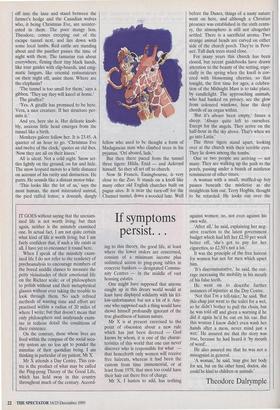If symptoms
persist.. .
IT GOES without saying that the unexam- ined life is not worth living; but then again, neither is the minutely examined one. In actual fact, I am not quite certain what kind of life is worth living, but I am fairly confident that, if such a life exists at all, I have yet to encounter it round here.
When I speak of the minutely exam- ined life I do not refer to the tendency of psychoanalysis to encourage members of the bored middle classes to measure the petty vicissitudes of their emotional life on the Richter scale; or of philosophers to polish without end their metaphysical glasses without ever taking the trouble to look through them. No such refined methods of wasting time and effort are practised within a radius of 20 miles of where I write; but that doesn't mean that only philosophers and analysands exam- ine in tedious detail the conditions of their existence.
On the contrary, those whose lives are lived within the compass of the social secu- rity system are no less apt to ponder the minutiae of their quotidian being. I am thinking in particular of my patient, Mr X.
Mr X attends a Day Centre. This cen- tre is the product of what may be called the Ping-pong Theory of the Good Life, which has held sway in this country throughout much of the century. Accord- ing to this theory, the good life, at least where the lower orders are concerned, consists of a minimum income plus unlimited access to ping-pong tables in concrete bunkers — designated Commu- nity Centres — in the middle of vast housing estates.
One might have supposed that anyone caught up in this dreary world would at least have displayed solidarity with his fel- low-unfortunates; but not a bit of it. Any- one who supposed such a thing would have shown himself profoundly ignorant of the true ghastliness of human nature.
Mr X is at present exercised to the point of obsession about a new rule which has just been decreed — God knows by whom, it is one of the charac- teristics of this world that one can never discover who is responsible for what that henceforth only women will receive free haircuts, whereas it had been the custom from time immemorial, or at least from 1978, that men too could have their hair cut there free of charge.
Mr X, I hasten to add, has nothing against women; no, not even against his own wife.
`After all,' he said, explaining her neg- ative reaction to the latest government budget which had left her £2.50 per week better off, 'she's got to pay for her cigarettes, so £2.50's not a lot.'
It was the principle of the free haircut for women but not for men which upset him.
`It's discriminatative,' he said, the out- rage increasing the mobility in his mouth of his false teeth.
He went on to describe further instances of injustice at the Day Centre.
`Not that I'm a tell-taler,' he said. 'But this chap just went to the toilet for a wet, so he didn't bother to pull the chain, but he was told off and given a warning if he did it again he'd be out on his ear. But this woman I know didn't even wash her hands after a mess, never mind just a wet.' He assured me that the story was true, because he had heard it `by mouth of word'.
He also assured me that he was not a misogynist in general.
`A woman,' he said, 'may give her body for sex, but on the other hand, doctor, she could be kind to children or animals.'
Theodore Dalrymple










































































































 Previous page
Previous page